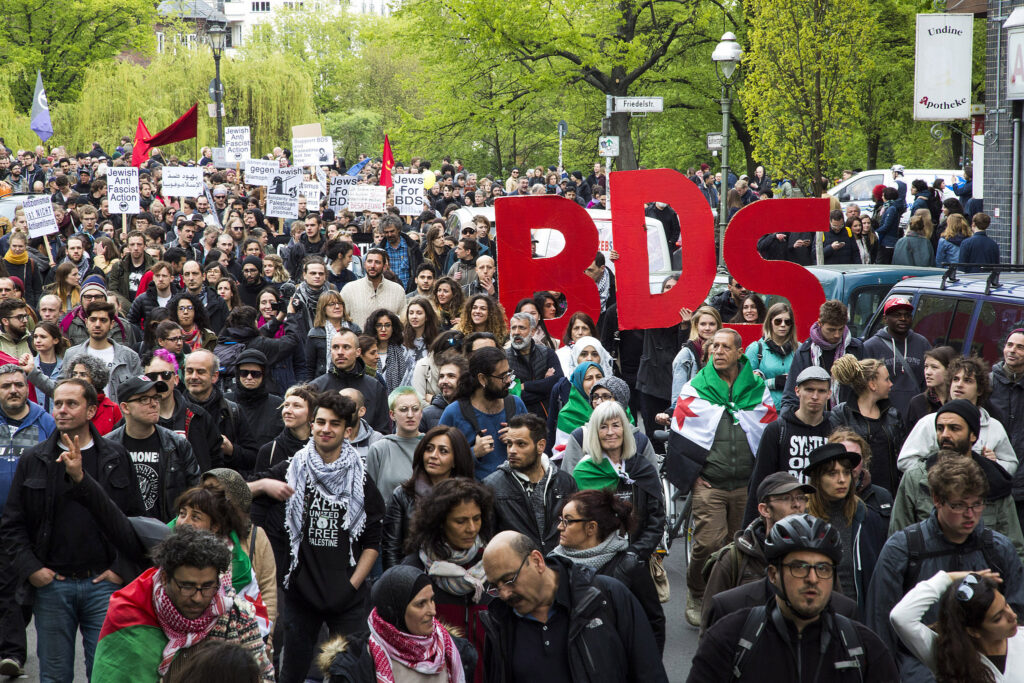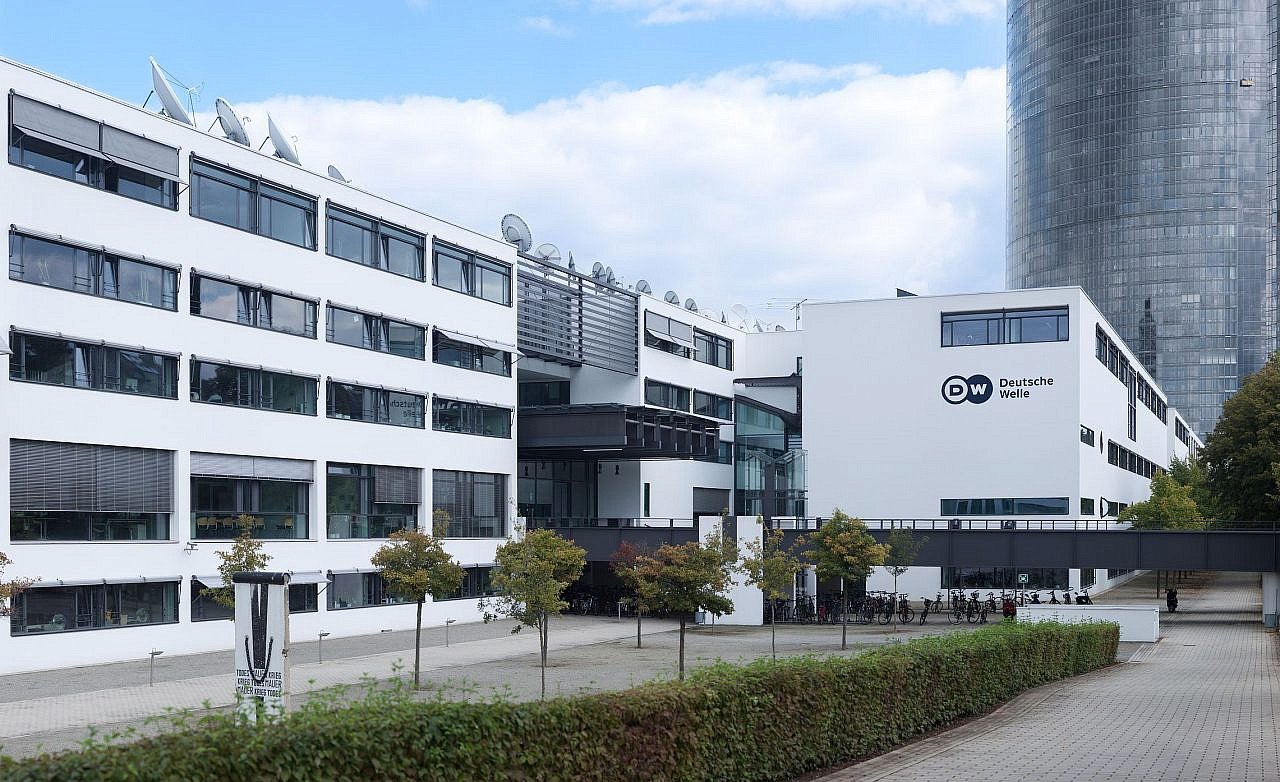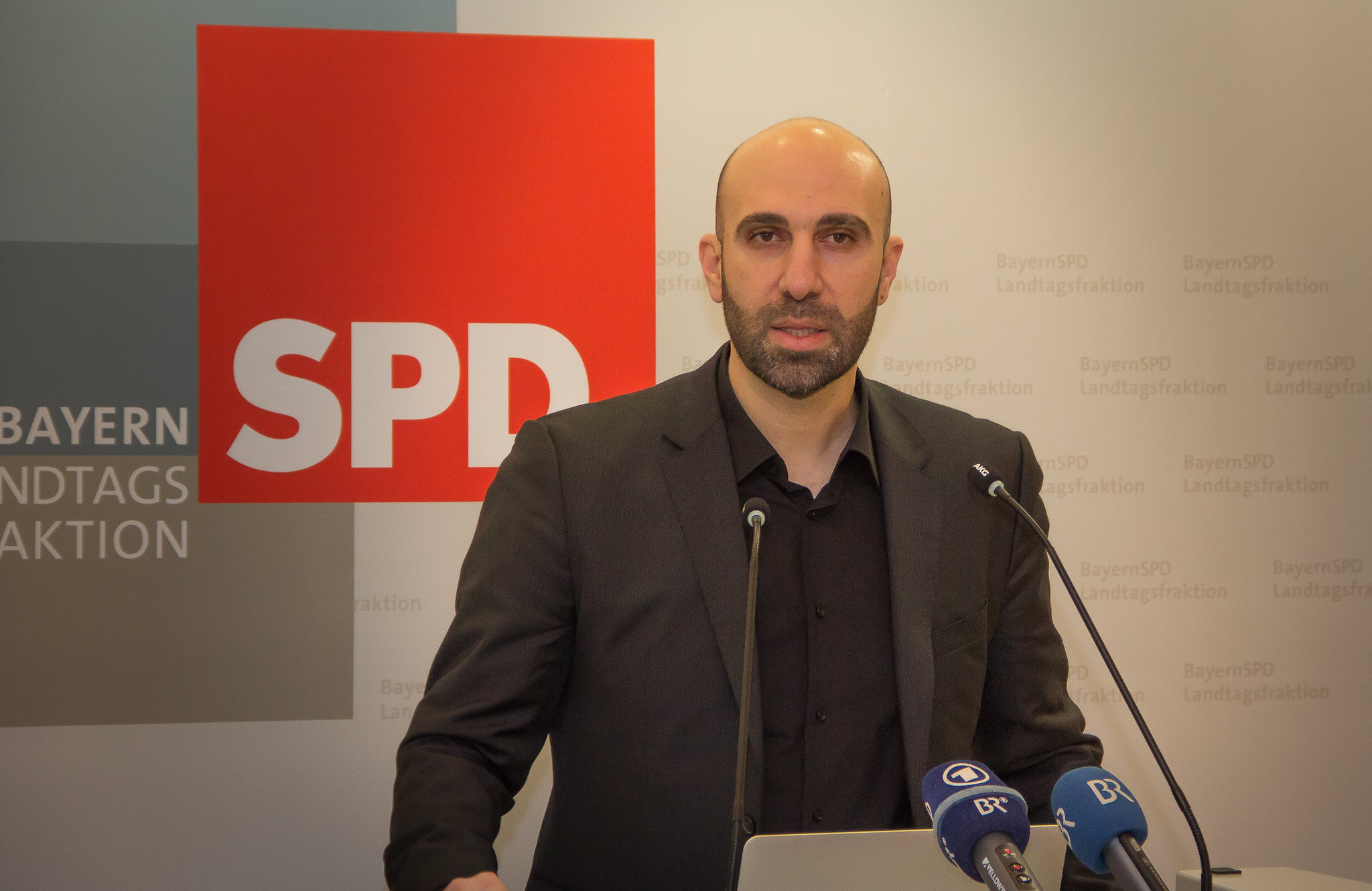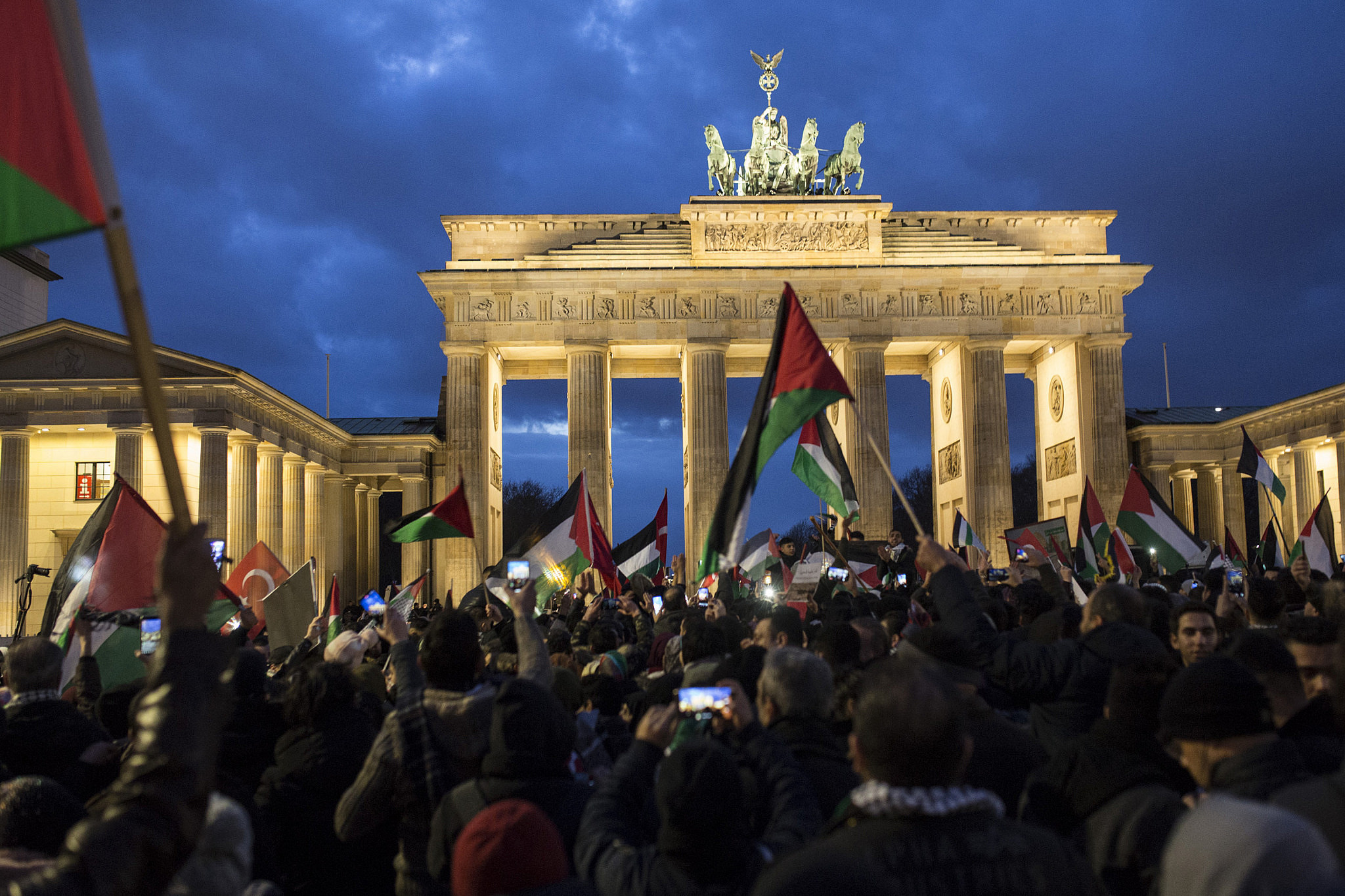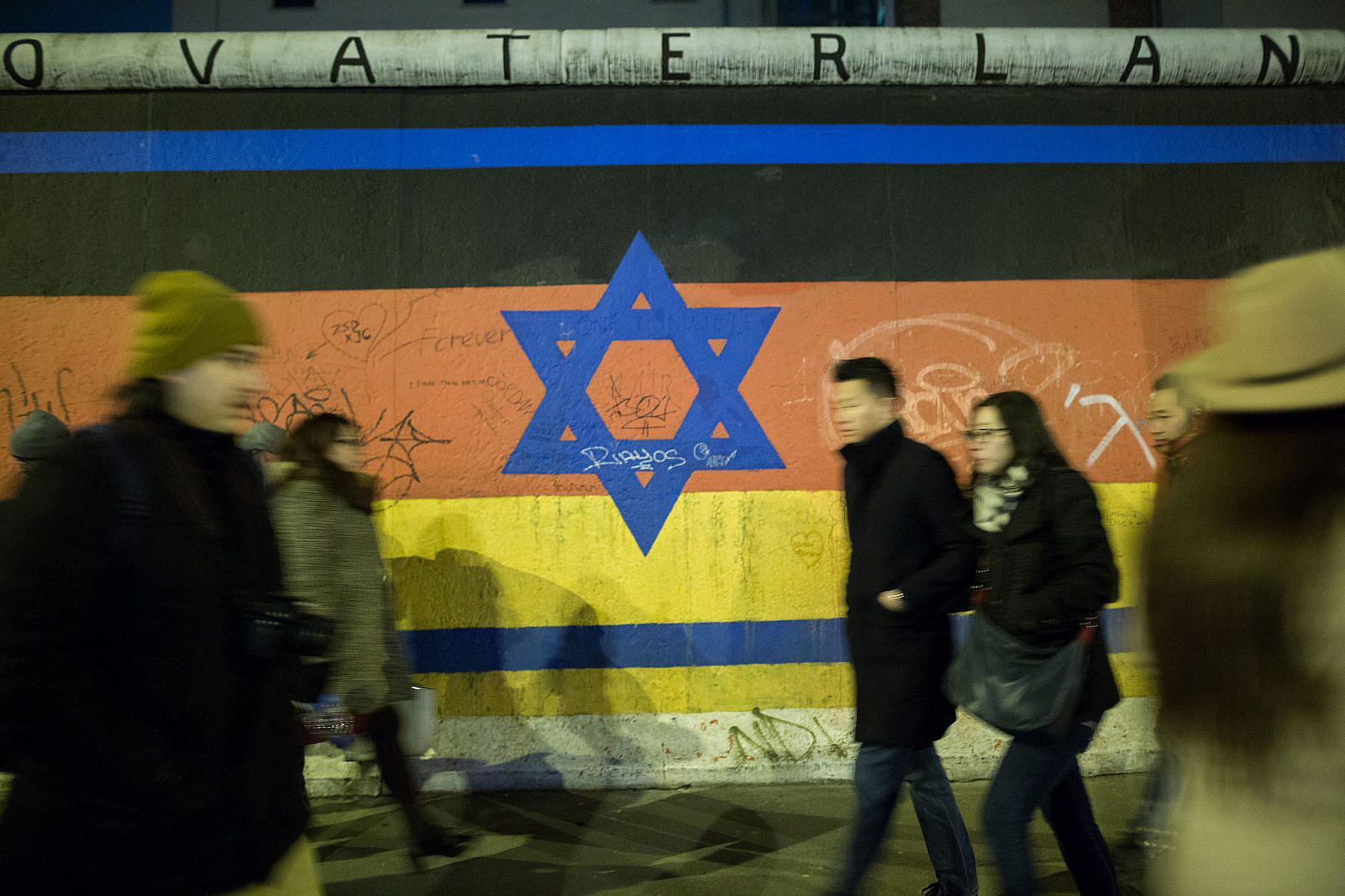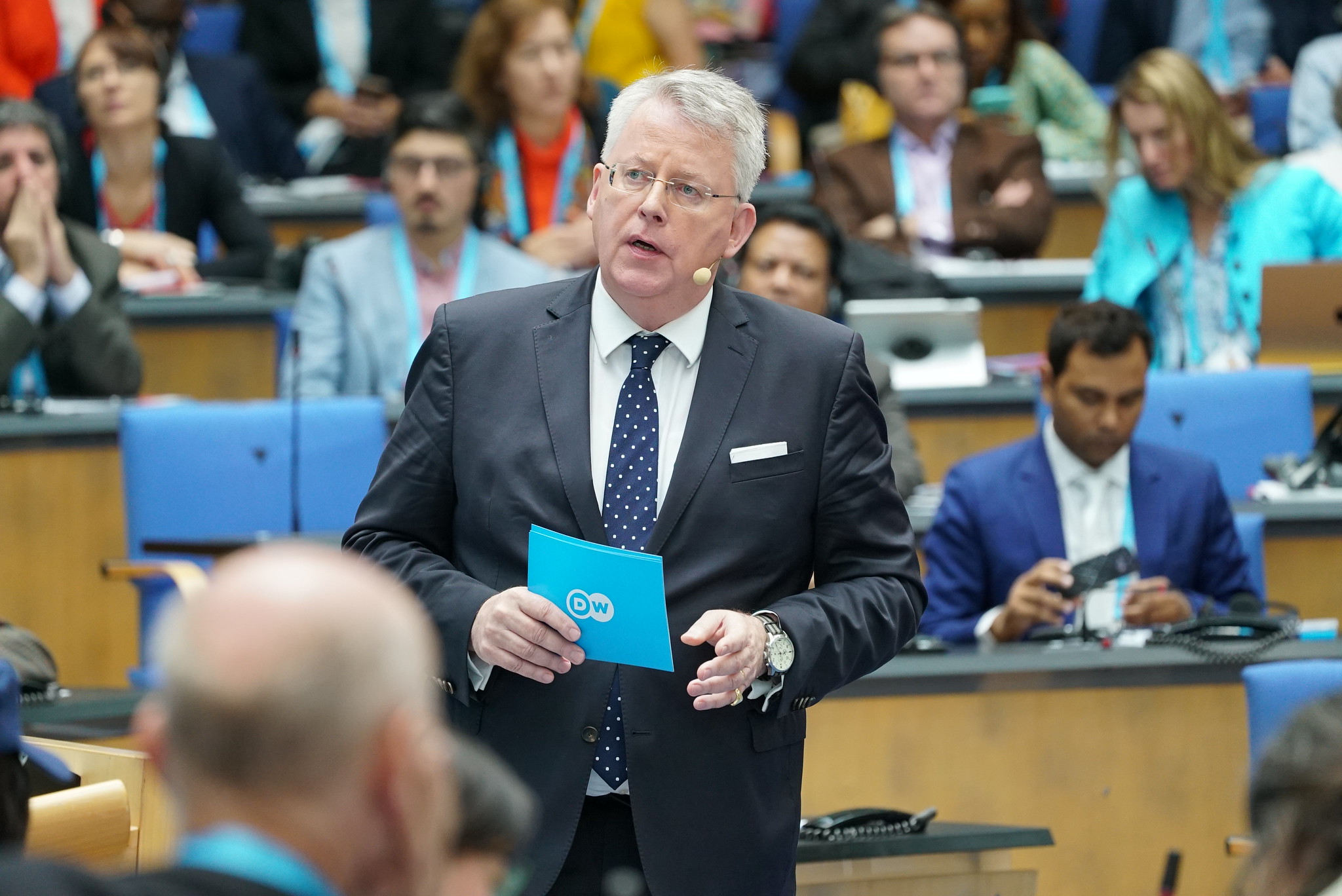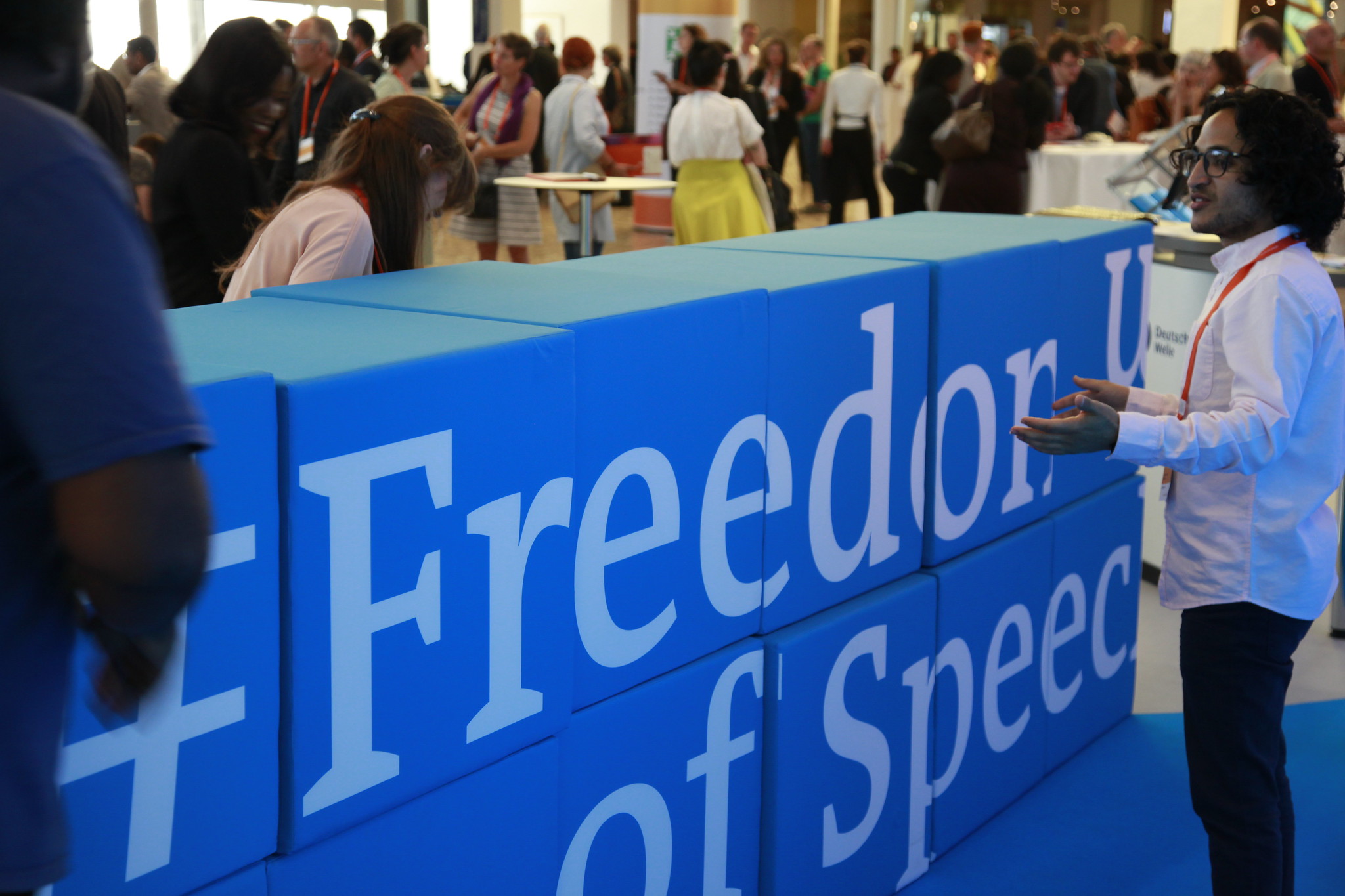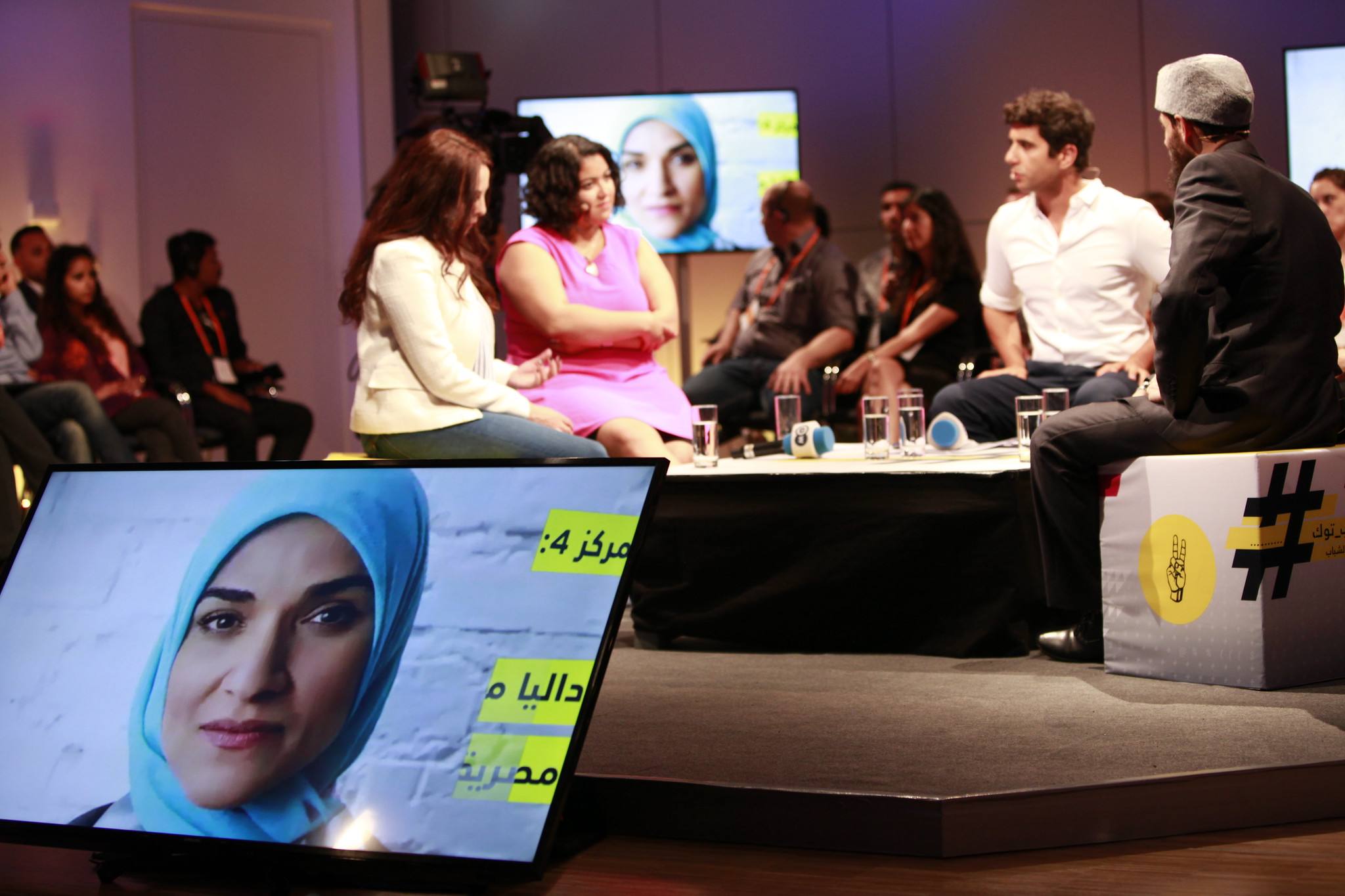‘All the Questions Were about Israel’: Inside Deutsche Welle’s Purge of Arab Journalists
PALESTINE - ISRAEL, 16 May 2022
Hebh Jamal and Lena Obermaier | +972 Magazine – TRANSCEND Media Service
5 May 2022 – When Deutsche Welle fired seven Arab journalists over accusations of antisemitism, many in Germany took its decision at face value. But a closer look shows DW’s investigation was riddled with political motives.
Pro-Palestine activists march during the annual May Day demonstration in Berlin, May 1, 2017.
(Keren Manor/Activestills.org)I am not collateral damage. I am a Palestinian Jordanian female journalist who went the hard way to improve her life and career here in Germany… [My comments were] ripped out of context… [No one was] interested in hearing my side of the story… It feels like I am still waking up to a reality where non[e] of the ethics I believed in or the values that I worked for and defended [were] applied to my case.
Farah Maraqa, who wrote these words in a series of blog posts, is one of five Arab journalists who, in December 2021, were suspended by the international German broadcaster Deutsche Welle (DW). A few weeks earlier, Maraqa — along with Maram Salama from Palestine, Basil al-Aridi and Dawood Ibrahim from Lebanon, and Murhaf Mahmoud from Syria — had been accused of antisemitism in a Nov. 30 article by Süddeutsche Zeitung, one of Germany’s largest daily newspapers, based on a series of social media posts.
DW eventually fired the five employees on Feb. 7, the same day that an external investigation into the allegations commissioned by the broadcaster was released to the public. The investigation did not find “systematic antisemitism” at the broadcaster’s Arabic section, where the journalists worked, but did conclude that there were “regrettable isolated cases” in which antisemitism was identified, as one senior staffer explained. A week later, on Feb. 14, two other Palestinian journalists at DW, Yasser Abumuailek and Zahi Alawi, were also fired.
Many German and international media outlets have taken DW’s accusations against the journalists at face value, with many assuming that the employees indeed expressed antisemitic views. A closer examination, however, portrays a very different picture.
Through a series of interviews and further investigation, +972 found that DW’s firings of the Arab journalists have not only raised allegations that the company violated German labor laws, but that DW’s external investigation into their cases was far from transparent or well-intentioned. In fact, the targeted journalists have expressed that the investigation appears to have been politically motivated and focused on scapegoating Arab and especially Palestinian journalists, leaving an environment of fear, distrust, and strict self-censorship when it comes to Israel-Palestine at an already mismanaged and scandal-ridden DW.
‘We tried to warn about his impartiality, but nobody listened’
The investigative report commissioned by DW was authored by Sabine Leutheusser-Schnarrenberger, a former Federal Minister of Justice, and Ahmad and Beatrice Mansour, founders of a for-profit consultancy group called MIND prevention. The latter organization, according to its website, seeks to “prevent Muslim extremism and antisemitism” in Germany, and claims to protect youth who are deemed to be at risk from Salafist and jihadist influence.
Far from being an “independent commission of experts,” as DW claims, however, the selection of the Mansours reflects — according to current and former DW employees with whom +972 spoke — a clear political motive behind the investigation. Many of those interviewed for this report asked to remain anonymous either in fear of reprisal, or because public statements might jeopardize their ongoing cases against DW.
Ahmad Mansour is a self-identified Arab-Israeli psychologist and a favored commentator on German television on the topic of Muslim radicalization and antisemitism. However, Georgetown University’s Bridge Initiative, a multi-year research project on Islamophobia, has described him as an anti-Muslim author who regularly portrays Arabs and Muslims as “backward and irrational.”
“Some Arabs are savages and some are not,” Mansour said in a Haaretz interview in 2019. He elaborated: “Let’s define ‘savage.’ I think mainstream Arabs have huge problems with democracy and everything connected to human rights. There are problems of violence that are related to culture. I don’t think most Arabs want to murder, but I think we do have a problem. Forget the Jews. Look how many Arabs murdered Arabs in recent years. It’s a lot.”
Esra Özyürek, an anthropologist and professor at the University of Cambridge, writes that Mansour’s 2014 bestseller book, “Generation Allah,” is plastered with “pseudoscientific statements” which describe all Muslim youth as troubled and potentially vulnerable to radicalization.
“The moment they named Mansour as one of the ‘experts’ in the committee, I thought ‘OK, this is not going to go very well,’” said one of the fired DW employees. “He is a known Islamophobe and has extreme opinions with regards to the Israeli-Palestinian conflict. So we tried to warn DW about his impartiality, but nobody listened.”
When asked about the hypocrisy of hiring an individual with a racist background of his own for an anti-racism investigation, DW’s corporate spokesperson, Christoph Jumpelt, told +972 that DW is “confident that the independent commission conducted their work unbiased and objectively.”
“It didn’t make sense,” said a current DW employee whom Mansour interviewed for the report. “He’s a political figure with a pro-Israel bias. I do not see how this investigation can be considered fair.”
Mansour also has links to pro-Israel groups as well as organizations that have been accused of Islamophobia. For example, he was program director at the European Foundation for Democracy (EFD), a Brussels-based think tank which Georgetown’s Bridge Initiative argues is focused on “defaming Muslim civil society organizations.” EFD is heavily funded by donors that include The Paul E. Singer Foundation, which supports the Israel Defense Forces (IDF), and The Marcus Foundation Inc., which funds Christians United for Israel, Friends of the IDF, and the Jewish National Fund.
Furthermore, it remains unclear why Mansour’s wife was invited to participate in the investigation. Beatrice Mansour is a co-founder of MIND prevention and a jurist specializing in criminology, but she is not an expert on antisemitism. Neither DW’s press conference nor the report itself clarified why she was brought onboard. “Nobody explained what she was doing. She did not clarify her contribution, and she didn’t introduce herself. Nobody understood why she was even sitting there,” said a current DW journalist.
Mansour did not respond to +972’s request for comment by press time.
‘All the questions were only related to Israel’
The investigation’s problems, however, do not end with the credibility of two of its main authors. According to DW employees who spoke with +972, Mansour’s investigation was meant to provoke an emotional and incriminating reaction from those he interviewed.
“They did not ask me one question about the supposed antisemitic Facebook posts that I wrote,” Maram Salama, one of the fired journalists, told +972. “Instead, they asked me about my upbringing, what I thought about Hamas, and, most troublingly, how I felt about Israeli children getting killed.”
Mansour also reportedly asked questions about the Boycott, Divestment, and Sanctions (BDS) movement, whether the interviewees supported a one-state or two-state solution, and even asked an individual, “For whom does [their] heart beat: Israel or Palestine?”
While not given a concrete reason for her dismissal — as was the case with the majority of the fired employees — Salama believes she was fired because of a Facebook post in which she expressed that freedom of speech in Germany was limited when it comes to Palestinians. “I did not even mention Israel in the post itself,” she said.
The dismissal caught Salama by surprise. A few weeks earlier, DW had given her an award for outstanding journalism; two days later, the management sent her an email notifying that she was not allowed to continue work pending an external probe. “I felt that my job was secure, because here is DW giving me an award even after the article broke. Then all of a sudden I was suspended and asked to take part in an investigation,” Salama said. “DW did not defend me from baseless accusations, and as a Palestinian, I instead had to defend that I was in fact human.”
“When Mansour asked to interview me, he did not tell me I was under investigation or that I was accused of antisemitism,” said a fired employee. “I agreed to speak to Mansour, then was taken aback when, in the middle of the meeting, he interrogated me about my political opinions and Facebook posts. I had nothing to hide, but it was still very uncomfortable.”
One employee with whom +972 spoke noticed that Mansour hardly even mentioned the word “Jewish” in his questioning, nor asked about their definition of antisemitism. “Mansour said the word ‘Jewish’ once, and it was in a question of whether I defined Israel as a Jewish-only country. All the questions were only related to Israel,” they said.
Dubious notions of antisemitism
In February, 100 human rights groups and activists condemned the firings in a joint statement, arguing that they are part of a widespread anti-Palestinian smear campaign intended to silence Palestinian voices and restrict freedom of expression around their cause.
“The DW report,” the statement reads, “adopts a problematic framework that conflates anti-Zionism with antisemitism, and seeks to position legitimate criticism of Israel as antisemitism… This approach also dangerously associates the actions of the Israeli authorities with Jewish communities around the world, and falsely links them to the systemic oppression of Palestinians.”
The DW report relies on the IHRA definition of antisemitism, which has been rejected by over 40 Jewish groups, numerous academics, and even its initial lead drafter. The definition is widely criticized for its lack of clarity on key issues relating to anti-Jewish bigotry, and for its widespread instrumentalization by governments, universities, and other bodies to suppress criticism of Israel.
In addition to its use of the dubious IHRA definition, several legal experts believe that the DW report contains an implicit bias. “The way the report is written is basically implying that Arab employees are more likely to be antisemitic or to make antisemitic statements than any other partner or employee,” Alice Garcia, a lawyer with the European Legal Support Center, told +972.
A clear example of this is laid out almost explicitly in the DW report: “Especially for DW as a public institution,” it reads, “it seems crucial that no one-sided attitudes toward the Middle East conflict and various actors involved manifest themselves among the staff against the background of different personal and biographical experiences of the employees from Arab regions.”
“Mansour is essentially telling DW that Arab employees have views that need to be monitored because they could easily be antisemitic,” Garcia explained.
The DW report begins by citing various comments made on social media by the fired journalists. Yet they are printed without their relevant context, in no discernible order, and without a system that would assign each comment to a particular writer. It is also not clear how many comments were under investigation and over which time period. “The report was supposed to look into the accusations of antisemitism against the DW employees,” said Garcia. “Instead, it is a convoluted document that mentions many other unrelated things and shifts the focus away from the individuals completely.”
As a result, clear antisemitic statements (such as “Jews control the minds of the people through the arts, the media, and music”) are mixed and conflated with criticisms of Israel (“[Palestinians] pay the price for Europe’s atrocities,” or the hashtag #SaveSheikhJarrah, a popular slogan referring to Israel’s attempts to expel Palestinians from the East Jerusalem neighborhood). It is also unclear if it was just one or several staffers who were guilty of making certain antisemitic statements.
The most straightforward evidence for the political motivation behind the investigation, however, is its probe into DW’s previous reporting on Israel-Palestine. The report criticizes several DW articles as “portraying wrong information as facts,” and finds that they are “antisemitic,” “cater to Hamas ideology,” and “deny Israel’s right to exist.”
In one instance, the report denounces a DW article claiming that the 2018-2019 demonstrations in Gaza (the Great March of Return) were organized by Palestinian civil society, a fact evidenced by a UN Commission of Inquiry that investigated the events. Instead, the report contends that the demonstrations were organized by the “terror organization Hamas” as there is “no independent civil society in Gaza.”
The report also denounces the mere mention of the word “Nakba” (“catastrophe”), the term used by Palestinians to describe the 1948 war. On page 15 of the document, the report further claims that Palestinians were expelled as a consequence of Arab provocations during the war. “They [Palestinians], at the request of Arab commanders, fled the war on the promise that they would return as long as the goal of the war — the annihilation of Israel — is achieved,” the report stated. Prominent Palestinian and Israeli historians have long refuted this claim, including through the uncovering of Israeli state archives.
The pivot to Israel-Palestine coverage “has nothing to do with the original cause of the investigation,” argued Garcia, who added that DW instead shifted the focus to a “supposedly flawed Arab perspective on the situation in Israel and Palestine.”
‘I had no help from a union that is supposed to protect workers’
Ahmed Abed, a lawyer representing some of the dismissed DW employees, argues that his clients’ terminations are a clear violation of labor laws, firstly for their violation of “duty of care.”
“DW did not inform the employees of their termination in due time,” Abed told +972. “Usually employers would give two weeks’ notice — my clients had no warning. After the press conference, they just sent them the termination documents without a reason written. Usually your superior and HR would sit down and discuss the investigation findings — that didn’t happen. The legal bases for their terminations are just so vague.”
The second violation was the prejudiced attitude. “It is illegal to investigate an employee because they are Palestinian or for beliefs you think they have,” Abed added. “These employees have been working for DW for years. The way they treated them is just undignified and without honor.”
The employees also complained that beyond Mansour’s lack of qualifications, there was also no professional translator involved in the investigation. “My German is not that good, so I needed to jump between English and Arabic sometimes,” said Salama. “I want to reiterate that even if Mansour is an Arab, it does not qualify him to translate anything of this caliber.”
Representatives within the Verdi Union, Germany’s second largest trade union which represents DW journalists, internally agreed that not only are the grounds for dismissal of some of the DW employees vague, but that the antisemitism definition has not been specified anywhere in DW, and a person’s support for BDS is not a justification for termination.
Despite suspicions of wrongdoing, however, the Verdi Union did not reach out to many of the fired employees after their termination to provide support. “No one contacted me, no one questioned my termination. I had no help from a union that is supposed to protect workers,” one of the former employees told +972.
DW’s elected staff council representative in Bonn, Daniel Sheschkewitz, told +972 that he did in fact contact several of the impacted employees, however faced limitations. “the staff council in Bonn has in one instance even argued in a written statement to DW against the dismissal and informed the person” Sheschkewitz said. “Unfortunately, we do not have the legal means to prevent dismissals within the German labor legislation.”
Moreover, +972 found that the decision to fire the seven Arab journalists was not the result of an executive committee formed to evaluate the findings of the investigation; rather, it was handed down by an executive order from DW Director General Peter Limbourg.
Indeed, the former employees told +972 that their immediate superiors in their respective work sections were not aware of what was being decided about their employment over the course of the investigation. “My boss kept asking me for updates once we found out I was being investigated,” one said. “No one knew anything. We were all confused.”
When asked by German journalist Markus Trantow about allegations of a climate of fear within DW, Limbourg strongly denied the accusations. “That is an absurd claim that is unfortunately repeatedly made by individual journalists,” he responded. “DW employees have the opportunity at any time to express their opinions, to address their concerns and questions to the management, executives and complaints offices of DW and to discuss them until they are clarified. The management is committed to an open, fear-free corporate culture and actively encourages our managers to support this.”
‘A very convenient scapegoat’
During the press conference on Feb. 7, Limbourg insisted that employees would have the opportunity to voice their concerns over the investigation process. But the Arab journalists who attended the various interdepartmental meetings told +972 that the environment within DW was filled with journalists and staff who were fearful of whether their personal opinions were now grounds for dismissal. DW could not answer questions about whether there would be intense social media monitoring, or whether their Facebook likes or Instagram followers could lead to termination.
When asked about their staff’s concerns, DW’s spokesperson Jumpelt told +972 that “every journalistic organization can expect their employees to adhere to the basics of what is generally referred to as ‘netiquette.’ Anything published by a person on social media can fall back on that person’s employer.”
On March 2, Gerda Meuer, DW’s Managing Program Director, reportedly told the Arabic department that nothing is private, according to those who were present at the time. “When you write something on your private accounts,” she said, “you risk damaging the image of DW. So be wary of what you write.”
Many employees within the Arabic department took this warning as a signal not to write anything about Palestine or to be political outside of their approved DW reporting. Notably, this aversion to talking about Palestine starkly differed from DW’s open stance in support of Ukraine’s right to freedom and self-defense against Russia’s invasion and military occupation in late February.
During the DW press conference, a recording of which was made available to +972, Mansour highlighted that there appeared to be serious divisions between staff and management.
“This is not the first time that the Arabic editorial team has unfortunately been part of negative reporting in recent years. It is not just about antisemitism, but other things like lack of dialogue between an editorial team with over 200 employees who have different attitudes and come from different countries” Mansour said. Schnarrenberger echoed this sentiment, adding “There is no pronounced trust in the management of the editorial department.”
Tom Wills, who worked on DW’s data journalism team, strongly disagrees with the claim that serious faults lie only within the Arabic department. “The idea that all of DW’s problems are within the Arabic department has come up before. They are racist tropes echoing down the corridors of DW about this being a result of conservative cultural issues or somehow connected with the politics of the Middle East,” he told +972.
Indeed, DW has been riddled with accusations of labor abuses before, as detailed in a Guardian article published in January 2020. Several DW workers said they were silenced and fired for speaking up about racism, sexual harassment, antisemitism, and bullying in the organization. DW strongly denied the accusations, stating that they were all “unfounded.”
Outraged by DW management’s response, 250 employees wrote a letter in February 2020 directly to Limbourg that was leaked to the press. In it, the employees stated that the incidents described in The Guardian were far from isolated cases, emphasizing instead that “DW has a problem with abuse of power.”
“There was no question for us that the problems were more widespread than the Arabic department, but of course that was a very convenient scapegoat for them to try to confine it to,” said Wills. “But the facts just don’t back it up.”
Wills, who was among the letter’s signatories, recounts that there was a recurring issue of freelancers being fired when they reported abuse by a staff member. “There is a very obvious pattern of mistreatment,” he said. “One of the structural problems of DW is that there is a big divide in the workforce where freelancers are not protected under German labor laws. Because of that, freelancers, many of whom are foreigners, are simply moved around or fired, contributing to a racist dynamic in a fundamentally, structurally unequal work environment.
“Those who were fired some months ago from the Arabic department had [written] within their letters of dismissal that there was a ‘breakdown of trust in the senior management of the organization,’” Wills added. “So it was spelled out in black and white that people were being fired partly because they have been critical of senior management.”
Since the antisemitism probe, DW has also cut off ties with Jordanian broadcaster Roya TV over accusations of anti-Israel comments and caricatures spread by the broadcaster on social media. An insider source, however, told +972 that DW has, in fact, suspended a majority of its projects in the MENA region out of Arab news outlets’ refusal of the terms of their new cooperations that include vague definitions of antisemitism.
During the press conference, Director General Limbourg announced that DW has also been working to incorporate an antisemitism definition within their employee contracts that includes a firm stance on Israel’s right to exist; but according to the insider, some staff are unwilling to acquiesce. “Nobody wants a vague definition of antisemitism in a work contract. It could be interpreted in any way,” they said.
‘It’s horrible that journalists have a personal censor’
Germany has a history of singling out Palestinian, Arab, and other journalists of color for alleged antisemitism. A prominent case was that of Nemi El-Hassan, a Palestinian-Lebanese journalist who last year was denied a previously-granted position on public television after photos of her at a 2014 pro-Palestine rally were revealed in right-wing media.
In July 2019, German authorities barred Palestinian-Canadian journalist Khaled Barakat from speaking at a Palestine solidarity event in Berlin, claiming his “antisemitic” speeches posed a threat to public order and could undermine the country’s relations with Israel. He was threatened with up to one year in prison and has been prohibited from attending any future political events in Germany.
Last May, during the Israeli assault on Gaza, DW took down an interview with Palestinian-American journalist and executive director of Electronic Intifada, Ali Abunimah, and apologized for airing it. Soon after, the broadcasting company sent an internal memo banning its employees from using words such as “apartheid” and “colonialism” to describe Israel.
Yet the persecution goes beyond journalists who support Palestine. In 2019, the German Bundestag passed a resolution categorizing the BDS movement as antisemitic, effectively giving state institutions and pro-Israel groups license to attack Palestinian organizations, artists, academics, and individuals by restricting them from public funds and public space.
Self-censorship has since become an unfortunate reality in Germany, with the ensuing fear leading many journalists, including within DW, to police themselves. “Even if my colleagues want to communicate with me, they tell me not to tell anyone in case they’ll face repercussions,” said Salama.
“Journalists within DW are scared, and they’ve been scared into silence,” she continued. “It is really horrible that journalists have a personal censor. It is a really dangerous trend in Germany that you cannot criticize Israel.”
For Salama, the consequences of this systemic hostility are all too real. “I worked really hard at my job as a journalist for 15 years, and now these accusations destroy my chances with any international media outlet,” she lamented. “I can’t believe that an institution like DW could put their journalists through this insane situation.”
__________________________________________________
Tags: BDS Boycott Divestment Sanctions, Gaza, Israeli Apartheid, Israeli occupation, Middle East, Nakba, Palestine, Palestine/Israel, State Terrorism, West Bank, Zionism
Join the BDS-BOYCOTT, DIVESTMENT, SANCTIONS campaign to protest the Israeli barbaric siege of Gaza, illegal occupation of the Palestine nation’s territory, the apartheid wall, its inhuman and degrading treatment of the Palestinian people, and the more than 7,000 Palestinian men, women, elderly and children arbitrarily locked up in Israeli prisons.
DON’T BUY PRODUCTS WHOSE BARCODE STARTS WITH 729, which indicates that it is produced in Israel. DO YOUR PART! MAKE A DIFFERENCE!
7 2 9: BOYCOTT FOR JUSTICE!
DISCLAIMER: The statements, views and opinions expressed in pieces republished here are solely those of the authors and do not necessarily represent those of TMS. In accordance with title 17 U.S.C. section 107, this material is distributed without profit to those who have expressed a prior interest in receiving the included information for research and educational purposes. TMS has no affiliation whatsoever with the originator of this article nor is TMS endorsed or sponsored by the originator. “GO TO ORIGINAL” links are provided as a convenience to our readers and allow for verification of authenticity. However, as originating pages are often updated by their originating host sites, the versions posted may not match the versions our readers view when clicking the “GO TO ORIGINAL” links. This site contains copyrighted material the use of which has not always been specifically authorized by the copyright owner. We are making such material available in our efforts to advance understanding of environmental, political, human rights, economic, democracy, scientific, and social justice issues, etc. We believe this constitutes a ‘fair use’ of any such copyrighted material as provided for in section 107 of the US Copyright Law. In accordance with Title 17 U.S.C. Section 107, the material on this site is distributed without profit to those who have expressed a prior interest in receiving the included information for research and educational purposes. For more information go to: http://www.law.cornell.edu/uscode/17/107.shtml. If you wish to use copyrighted material from this site for purposes of your own that go beyond ‘fair use’, you must obtain permission from the copyright owner.
Read more
Click here to go to the current weekly digest or pick another article:
PALESTINE - ISRAEL:
